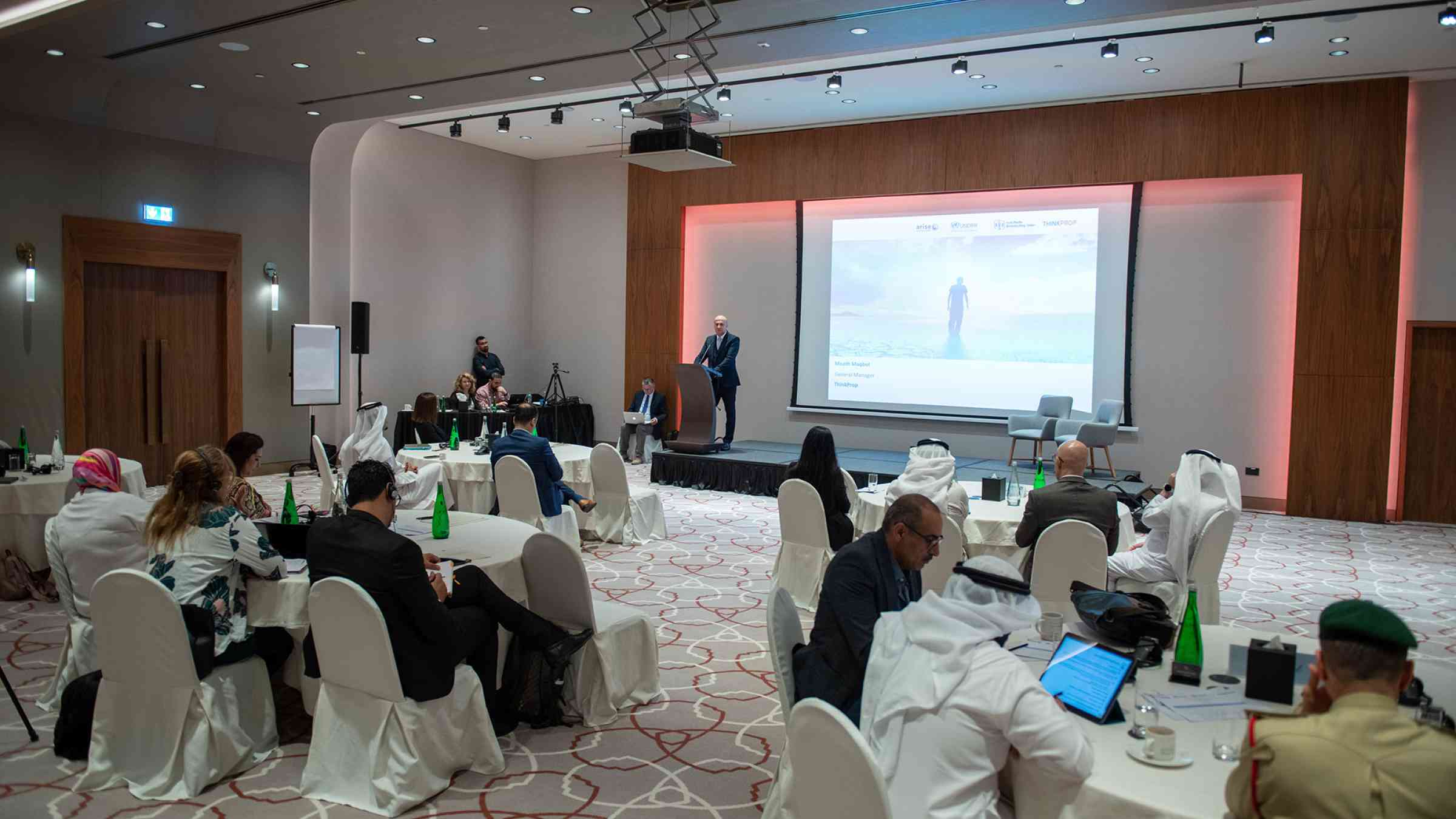Journalists and media professionals committed to promoting disaster risk reduction and climate change adaptation

Abu Dhabi, 31 May 2023 – The United Nations Office for Disaster Risk Reduction (UNDRR) – Regional Office for Arab States (ROAS), in collaboration with the Asia-Pacific Broadcasting Union, the Private Sector Alliance for Disaster Resilient Society (ARISE-UAE), and ThinkProp real estate training institute organized “Disaster Risk Reduction and Climate Change Media Workshop,” which comes within a series of workshops organized to actively engage and participate in the upcoming UN Climate Change Conference (COP28).
The two-day workshop came timely in preparations for COP28 hosted in Dubai, UAE to raise the awareness of local and regional media outlets on climate change and disaster risk reduction, focusing on the linkage between them and in alignment with the Sendai Framework for Disaster Risk Reduction and national disaster risk reduction strategies.
The workshop saw the participation of local and regional media representatives and UN agencies and aimed to improve the journalists’ role in disseminating information before, during, and after disasters of all types, ranging from disasters triggered by natural hazards to human-initiated ones.
“Whether triggered by natural hazards or human actions, disasters require informed reporting to raise awareness, guide preparedness, and facilitate effective response and recovery efforts,” said Rania Hammad, Programme Management Officer at UNDRR ROAS in her opening remarks. “However, research indicates that journalists are often unprepared to cover various types of disasters.”
Over two days, the workshop promoted a clear vision among local and regional media representatives from Arab countries on their role in disseminating information before, during, and after disasters of all types and in stimulating public awareness of the urgent need for disaster reduction, making disaster risk and environmental issues more visible, such as the impact of climate change, and strengthening society's perception of the most pressing threats and give a voice to people who face these threats.
“Big data and predictive analysis are the most trending and effective technologies that we can use in predicting hazards, thus reducing disaster risks," said Moath Moqbol, ThinkProp General Manager, stressing the importance of having an approach to disasters and crisis management based on technologies and data, as with such approach, it is possible to prevent disasters and to drastically reduce their mortality.
The workshop addressed the United Nations Early Warnings for All campaign and the role of media to provide timely, accurate, understandable, and actionable messages to save lives and protect livelihoods. Moreover, it explored content development for mainstreaming disaster risk reduction and climate action in all formats, from news and current affairs to documentaries and entertainment.
The participants were introduced to the UNDRR Disaster Risk Reduction Media Hub, which caters to journalists and broadcasters seeking deeper insights into the urgent, terrifying, and all-too-often tragic moments when a populated built environment is challenged by the forces of nature or a man-made disaster. It draws upon the expertise of journalists, disaster experts, and researchers to take a comprehensive and systemic approach and emphasizes the multidimensional and interconnected nature of the risks we face, and puts forward a blend of practical information, professional approaches, and underlying principles for the effective reporting of disasters.
In October 2022, in conjunction with the International Day for Disaster Risk Reduction and in preparation for COP27, UNDRR organized the first Disaster Risk Reduction and Climate Change Media workshop. The objective of the workshop was to raise awareness among local and regional media representatives regarding the interconnection between climate change and disaster risk reduction.
As a result, the Arab Media Network for Disaster Risk Reduction and Climate Change Adaptation was launched, representing the first media group in the Arab countries concerned with reporting on how to reduce disaster risks and adapt to climate change by changing the mindset or way of thinking in approaching matters, as it calls for a shift from "disaster response” to “disaster management” to mitigate the level of fragility that makes communities more vulnerable to risks and therefore to disasters.
It requires a whole-society effort to ensure that all risk communities are prepared to take action when alerts are issued, and no group is more important in this endeavor than the media. Journalists and other media professionals play an essential role in educating decision-makers and political leaders about the real nature of disasters and their causes so they can take policy decisions that mitigate future risks and do not turn a hazard into a disaster.